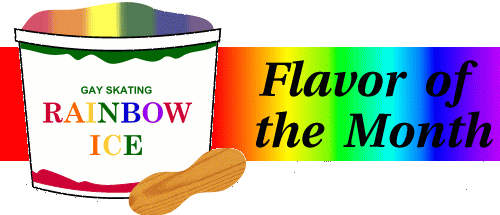

| Graphic by YIKES,Inc. |

In the U.S., 1984 Olympic gold medalist Scott Hamilton is probably the best-recognized and wealthiest male figure skater. A major element of his popularity is his lovable, good-guy persona. But one not-so-lovable Hamilton trait has been his lifelong homophobia, which he discusses with uneasy frankness in his 1999 autobiography Landing It.
Hamilton became famous in the 1980s not only for his triple lutz and impeccable figures, but also because he rebelled against ornate or effeminate-looking figure skating costumes and favored the athletic look of a speed skater-like bodysuit.
"Frankly, I was sick of people constantly assuming I was gay because I was a figure skater," he wrote (p. 191). "This fear of being labeled definitely played a role in my decision to radically alter my costumes in my last year of amateur skating." It was not until 1997, in his "Figaro" program for the Stars on Ice tour, that he had the security to wear an ornate costume, and even then it was in the context of an ironic, comedic parody. Hamilton commented publicly that he was nervous about that costume, but audiences accepted it readily.
It is clear from the book that Hamilton has attempted to do some soul-searching on the issue. "'Homophobic' was an accurate description of my feelings toward gay men," he wrote (p. 192). "I used to joke about the lifestyle, partly because I had spent the previous 16 years fending off the cruel humor directed at me. 'Fairy,' 'sissy,' 'faggot,' I had heard them all." Hamilton's story is a clear example of how homophobia affects U.S. male skaters regardless of their personal orientation.
He credits gay friends in the skating world with helping to reverse some of his bigotry, naming Brian Pockar and Rob McCall in particular. Of McCall, he said, "He never made a secret of his sexual orientation..." (p. 193). However, this may not be entirely true. Both men's deaths of AIDS have been widely covered in the media, but never until Hamilton's book had either of them been reported as gay to the best of Rainbow Ice's knowledge, suggesting strongly that they or their loved ones had not wished it. Hamilton may have performed posthumous outings on his two late friends.
From Hamilton's general tone, it is difficult to imagine that he will ever be fully pro-gay, but he makes an effort. His final words on the subject (p. 194) deal with the fact that in skating, all things boil down to the essentially personal and honest nature of the sport: "If your sexuality is an important part of your makeup and you want to show it on the ice, then go for it. Do what makes you happy. Some people will like it, and some won't."